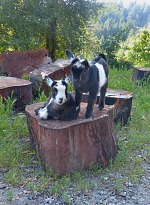 |
| Boys grow like weeds. |
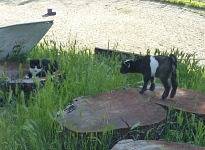 |
| Meeting the young stable cat. |
Twilight's twins needed de-horning to be arranged. I clenched my teeth and paid
a new visit of the vet. She, while checking the baby bucks, stated that Rocket
had a staphylococcal dermatitis, and left me with a small bottle of penicillin
and a supply of syringes and needles. All I had to do was learning how to do
subcutaneous injections. I used small needles to minimize baby goat stress from
large punctures, but tiny needles clog up more, which is a situation that has
no good solution.
Three days after Rocket I noticed staphylococcal pustules on Pluto, and thus I
had to start giving him penicillin as well. It meant needing a helper in the
morning and in the evening, who would either hold the baby goat, or inject,
since I only possess one pair of hands. These are the situation I am awfully
grateful for Lisa. She wants to become a veterinary technician, and is the only
one in the family not troubled by attending to sick animals. And she does not
freak out over crying nine-pound baby goat. Thus, Lisa and I took turns in
injecting and holding the baby bucks.
Tom could manage to hold them, but would not give the
shot. Similarly with the stable hands, whom I commanded to help me with my
morning medications during weekdays, when Lisa was in school.
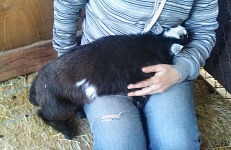 |
| Casper, one month old, won't fit onto a person's lap anymore. |
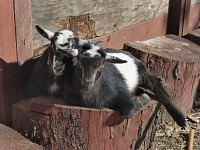 |
| Casper enjoys the company of his cousin Pluto. |
We were generally lucky with Lisa. Some people have to take their teenage
daughters to shopping malls, fashion and beauty salons, to be
cool
parents. I take my daughter, for example, to watch my treatment of a ruptured
vaccination spot, which is bursting with white pus (as it happened to Licky),
or to goat births, and let her give injections. Sometimes, Lisa is a real
savior. Like one morning, when a desperate stable hand Trudy called us right
after we arrived that a pony named Toby had something horrible happening with
his eye, and that she cannot even look at it, and whether I could look instead.
I must say that seeing, even from a distance, a bloody something the size of
a tennis ball hanging where the eye should be, made me somewhat woozy. A closer
inspection showed it was not an "eye bulged out of its socket" but
"only" an inverted and incredibly swollen lower eyelid. That we would,
either one of us, be able to treat with drops, but only because "somebody
had to do it". Lisa considers treating a brutally inflamed eye interesting.
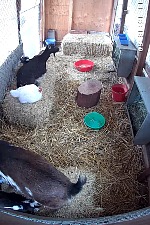 |
| Chicken Vanilla most likely identifies as a goat. |
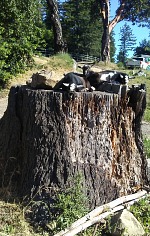 |
| The boys were properly proud of themselves when they managed to climb up the giant stump for the first time. |
But back to the baby goats. Because Pluto got added to my medicated herd,
I needed a multitude of needles. So I spoke with the veterinarian that I would
drive up to her place pick the stuff (I still had a full bottle of penicillin).
Given the quarantine, it look like a bad gangster movie. Picture a van, crawling
slowly through the street, looking for an address. Once found, it parks,
a person jumps out, masked in the face and wearing gloves, reaches a dead-drop
box on the corner of the house, picks up syringes and needles, and briskly
leaves the
crime scene. It would be awfully funny, had I not
been bound to wear gangster accessories out of necessity — not as much
for my sake, but to avoid causing trouble for the friendly veterinarian, since
her neighbors would snitch on her that she's seeing people without masks.
Alas, this has not brought the end of our baby bucks' trouble — a week
later, dermatitis returned; several weeks later, again, for the third time.
By then I included butt washing
(dermatitis shows mostly on hair-less parts) of the baby goats,
and of Twilight's udder with disinfectant, thinking that if did not help, they
all would have to get blood sampled and the infection would require targeted
treatment. All this time I was worried that Twilight might catch it from the
boys — for I would be able to stab her with penicillin once — for
the first and also the last time. Lisa commented it that she could completely
imagine it: Twy would dislocate her jaw like a snake and eat me alive, after my
second attempt. Fortunately, dermatitis is more typically a symptom of weakened
immunity (we all carry staphylococci on our skins, but only weakened individuals
get them multiplying inside), so in the end I was not devoured by a
monster-goat.
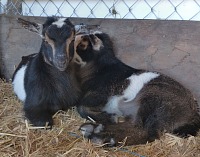 |
| Rocket is hiding behind his older brother. |
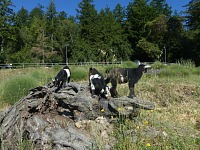 |
| Baby goats, flowers, spring. |
Dermatitis aside, the baby bucks were doing well, and Casper was all beside
himself that he finally found friends with whom to goof about. He sometimes
tried to maintain the dignity of an (by a whole week!) older and bigger cousin,
but then jumped right into the storm of bucking, pushing, and chasing each other
through the stables. And since Casper spent his first week on laps of various
kind people, he still considered human lap to be his exclusive spot, and kept
pushing the twins away from people. Having more helpers did not make it better
— the baby goats did not require each a lap, but all wanted that one.
It surprised me, though, how they cooperate. Coming back home from our round
intended to let them (the babies) walk and (the adult goats) to graze, Casper
got stuck while running among stumps, and missed the herd, which had left
already. I was turning around the corner of a barn,
when Rocket and Pluto stopped and started to scream.
Their mom went ahead, so for a while I did not see why they would
cry to the adult goats so desperately — but they were missing their cousin
and obviously were alerting the rest of the herd that it needed to stop and
deal with the missing baby goat. So despite fighting some of the time, they
regard each other as friends and have each other's back.
Casper has acquired a fan-club with a populous base, and first parties became
interested in getting him. Eventually I have sold Casper to
a stable hand named Trudy, who seemed the most suitable person. Casper, as it
seems, loves her right back, and understands whom he belongs to — follows
Trudy around, she can carry him away from his mom without protests, and it
seems that they are made for each other. Thus I have gained a person, who is
directly interested in Casper's well-being, and consequently in well-being of
all other goaties, and who comes to check on their stable even outside her duty.
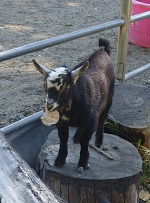 |
| Our baby goats eat more and more solid food — although they still fight with larger leaves. |
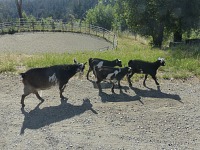 |
| Onward to graze! |
Meanwhile, my menagerie has grown by a chicken named Vanilla. Flies and
mosquitoes had multiplied in the pen, and with baby goats around, one cannot
deal with insects through repellents and flytraps (goats climb everywhere
and get tangled into everything), and thus I chose a truly organic method
of fly elimination. First I tried combinations of various chickens, under the
impression that at least two of them would do better than one. Some chickens
dithered unhappily while with the goats, looking for a hole in the fence to get
back to their flock. Other chickens were overly wild and I had a hard time
catching them in the morning, to put them in the goat pen, and in the evening,
to return them among their own. There's no good place for a chicken to sleep
by the goats, and I thought that it would be better to let them formally stay
with their colleagues, and they also need real chicken feed, which happens to
to be toxic for the goats.
Yet within a week I noticed that Vanilla kept loitering around the door, waiting
to be let to the goats. I tried to provide her with a chicken friend, but
Vanilla kept chasing other chickens out of the pen — so now she goes there
alone. We have a system — in the morning I let goats out of the goat pen
and Vanilla out of the chicken pen. Everybody gets to stretch legs around, and
when I come back to close the goats up again, Vanilla either waits at the door,
or lets me pick her up and carry her in, without a problem. Through the day,
Vanilla scratches importantly in the pen and the goat run, or goes to roost and
nap with the goats on their bales of straw — in the evening she lets me
move her again back to the other chickens. There was only one problem, before
we figured out she would mislay in the hay barn; eggs are harder to find among
bales of hay or straw.
A young cat named Jay (alias Hugo — I think he's got more names, I just
can't remember them all now) became the next member of the herd. Jay arrived to
the stables in the fall, accompanied by his brother; alas, his brother got lost.
Jay kept looking for him and weeping all around the stables, which broke the
heart of the stables' owner, stable hands, horse people, and mine, too —
so everybody keeps bringing him treats and plays with him and try to make him
happier. Jay joined me when I take the goats grazing — after all, if dogs
can herd sheep... The young cat first smelled to grasses and bushes, and one
could see he was quite wondering what the goats see in them. Twilight, in
return, checked out a mouse hole and could not figure out why it should be
interesting. When Casper was born, Jay was positively ecstatic, finally another
youngster, and tried to play with Casper. They did not find a common language
— Casper does not know how to slap faces with paws, and the cat does not
comprehend principles of head-butting. But at least the cat and the baby goats
tolerate each other, and can stay in close proximity. Adult goats keep chasing
the cat away; they have never accepted him.
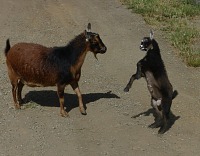 |
| Casper is cocky and daring. |
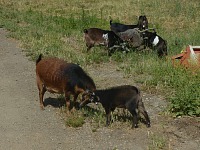 |
| Brownie holds on, while Casper works hard. |
Jay is an autumn cat, and in the spring he reached a point he needed to be
castrated, but thanks to quarantine, veterinarians have such
"elective" procedure forbidden.
By the begin on June the cat injured his eye, and thus
the stable owner, Tony, got him to a vet. The doctor found a foxtail stuck
under Jay's eyelid, so it was good they went, for otherwise it could have
developed into worse trouble. Tom and I were picking Jay up from the vet's,
poor cat was still half anesthetized, and thus he did not make any racket in
his crate on the way home. We had a roomy cage ready for him in the shed
— with a cone around his neck (because of the castration) we could not
let him roam outside. Then he got a prescribed lotion for his eye and pills
for pain, and we needed him handy to administer those. Jay was unhappy in his
cage, crawled on bars, but never scratched anyone during all this time, and when
he finally got out, he still followed us trustingly.
By then the baby goats were almost two months old and it became evident that
our little bucks would need castration too. Bucks mature within eight weeks
— in the sense they can reproduce — and hormones get to jerk them
around. I'm generally not afraid that they could impregnate any of the large
goats — they're not interested in them, much less now, in the summer, out
of season. Yet young horny bucks are very obnoxious, and for their insistence
they can buy a rather ugly bruise from an upset old goat.
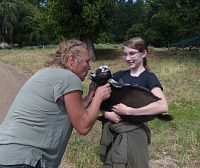 |
| Casper has a new mistress. |
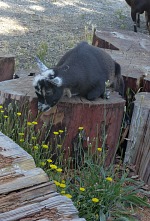 |
| Some goats are so lazy, they prefer to lie down when eating... |
Goats operate in a way similar to horses. Mothers are very strict and don't
suffer any disobedience or horse-play. I would even dare to say they lack all
sense of humor. Thus, in the end, the one who best tolerated excesses of the
juniors, was the old grumpy loner, wether Brownie. When Casper started provoking
him, Brownie responded by playing along, even though he could have literally
bulldoze over the young cocky buck. He let Casper challenge him for a while,
then whipped his head — but the head-butt always stopped a quarter inch
short of Casper's head or soft belly. Simply, Brownie would never hit him!
Sometimes they played push-over — but again — Brownie has at least
ninety pounds, Casper maybe twenty — theoretically it should look like
a battle between a tank and a stroller — but Brownie held his ground and
allowed Casper huff and puff and do his best. Brownie has not been my favorite
goat, for he's prissy and moronic (eats papers and plastic bags and garbage),
but this way he gained my heart.
But back to castration. My court veterinarian has stayed still in New Zealand,
which simply was a problem. Being originally from New Zealand, she had learned
all her skills on sheep, and if you have a herd of sheep, procedures like
castration have to happen quickly; you can't dawdle for an hour around every
little ram. Here, the veterinarians keep claiming their surgeries have to be
humane and thus under anesthesia. I personally disagree, for anesthesia turned
out stressful all by itself with my baby goats. First an injection, then a drip,
then the goat is asleep for the actual surgery. It wakes up disoriented,
thirsty, it's legs don't work well for up to an hour, which is for pray animal
a life threatening disability, a crazy stress. Burning off horns without full
anesthesia cannot be possibly pleasant, but it takes a few seconds, and with
topical anesthetics the baby goat is back with its mother in a few minutes.
The same thing works with castration using a "rubber band". It's
a matter of a few minutes, plus one injections with analgesic, and the little
buck can continue running around normally, plus has no open wound.
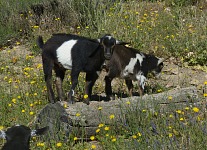 |
| Pluto and Rocket. |
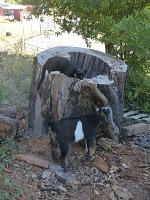 |
| Anybody can have a shepherd dog... |
Thanks to complications with covid I had to take the boys all the way to Gilroy,
which meant yanking them away from their mothers, stuffing them into crates,
drive 40 miles to Gilroy, there every one endured half hour castration
(altogether 90 minutes then), and forty minutes drive back. I.e. three hours
without mom, suffering general anesthesia and open wound.
Putting on a rubber band would take some ten minutes and we would not have
to drive out to the clinic.
I suspect that it's not at all about the humanity of the procedure,
but about the fact that de-horning or rubber-band castration would cost
around fifty dollars;
a surgery with anesthesia price is three to five times higher.
Besides, I made a bad experience with Tri County in Gilroy. When I begged them
upon my departure to give me banamine for the boys so that I could jab them
something against pain, I was told it was not possible, and they'd be OK.
They were not OK next day, three hunched bundles of unhappiness, tails drawn
between legs, spasmodically shivering somewhere in a corner, afraid to lie down.
Casper had it worst, he would not eat. That was Saturday morning. So I called
Gilroy, they admitted in the end that perhaps they could give me something for
Casper, but only if I come pick it up. Then I had a moment of clarity and I
wrote to my alternative vet in Santa Cruz (three times closer) and though it
was Saturday morning, she promised banamine. She handed me nine shots and told
me not to even think about it twice and just administer it to all of them
— after all nobody ever enjoys castration — and I shall see on
following days.
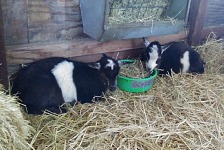 |
| Two bundles of unhappiness after returning from the vet. |
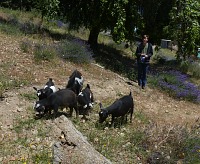 |
| Goatherd. |
Boys started jumping after the first shot like nothing ever happened, were
somewhat less jumpy on the second day, but certainly not stressed out, and
thus I did not torture them with another dose of banamine. But why they could
not issue me this cover-all analgesic right at the clinic, I don't understand.
So I would like to add to the "humane" argument — of ten
previous little bucks I have witnessed rubber-banded, only ONE experienced some
pain, others were fine. With castration surgery, all three were in pain.
A week later Lisa noticed that Pluto's wound was bleeding, so we dressed it
— and I called the vet. They said it was normal, even desirable, with
open wound castration, as it cleans that way. Hmmm. And they should have told
me all about it at the clinic and give me instructions. When I re-read them,
it said the bucks should not be allowed to jump for a week. If you ever saw
baby goats, that advice is simply golden. My lesson from all this is that next
time I should be better prepared, and de-horn and castrate my animals myself.
It will save many hundreds of dollars, and relieve the goats of much stress.






















